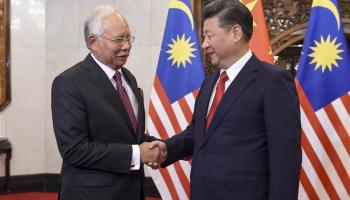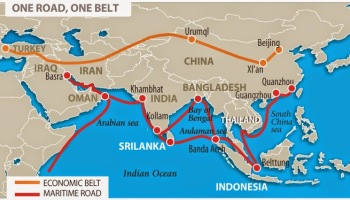Malaysia can achieve high income nation through Belt and Road initiative, says minister
https://youtu.be/IjEEOkPW8Zc
MALACCA: Malaysia can learn from China which is skilled in attracting and profiting from the knowledge and skills of its human capital, said Datuk Seri Dr Wee Ka Siong.
The Minister in the Prime Minister’s Department said China was creating an innovative economy and not just a high-income one driven by strong domestic consumption.
“China’s leadership is building on ambitious growth targets based on equality, efficiency and evaluation. We need to emulate this trait,” he said. Dr Wee was speaking at the opening ceremony of the 8th World Chinese Economic Summit (WCES)
WCES is organised by the Asian Strategy and Leadership Institute (Asli) with the aim of promoting global and regional dialogue on the emergence of China as the world’s largest economy and bringing together the global Chinese diaspora.
Dr Wee said that Malaysia, through its participation in China’s Belt and Road initiative, would be able to achieve its aim of becoming a high-income economy by 2020.
“China can appeal to a variety of demographics within Malaysia. By utilising the diversity and skills of the multi-ethnic Malaysian workforce, China can further capitalise on business ventures in the region.
“This can include leveraging on the country’s Mandarin-speaking citizens in order to effortlessly conduct business, or using Malaysia’s large Muslim population to expand investment into the Middle East,” Dr Wee said.
One of the projects that came into the picture as an effect of Belt and Road was the Melaka Gateway that attracted an investment of RM43bil from China.
China’s southern province of Guangdong, which has established a friendly state and province relationship with Malacca, has expressed its interest in investing RM8bil in an energy project in the state that will create between 5,000 and 20,000 jobs for the locals, Dr Wee said.
On e-commerce, which currently contributes 16% to the GDP, he said that only 55% of local consumers use the Internet for shopping.
The appointment of Chinese Internet billionaire Jack Ma of Alibaba Group as the Government’s digital economy adviser will help tap the vast potential of that market.
The e-commerce market (excluding e-services) in Malaysia for this year was expected to reach US$991.1mil (RM4.3bil) in revenue, while the global e-commerce industry was projected to surpass US$3.5 trillion (RM15.3 trillion) within the next five years, said Dr Wee.
Related posts:

Stop bitting the helping hand
Many of the negative responses over the deals with China seem to be politically motivated, stemming from ignorance and, in some cases, et...
The new China Syndrome: don't tell Chinese balik Tongsan, Tongsan coming to Malaysia
That is what is sorely needed to improve MCA’s chances of winning back
the Chinese vote in the next general election, which is Najib’s ult...
 Jack Ma advisor to Malaysian Govt on digital economy to start with e-FTZ
Jack Ma advisor to Malaysian Govt on digital economy to start with e-FTZ
https://youtu.be/fb74uSG-7Ro China-Malaysia Promising relationship: Najib delivering his speech in Beijing. ‘A digital economy with e...
 Keep China's faith in us; Relationship with China is crucial, says expert
Keep China's faith in us; Relationship with China is crucial, says expert
Prime Minister Datuk Seri Najib Razak (L) and China's Premier Li
Keqiang at the Great Hall of the People, in Beijing. - EPA
Malaysian PM Najib given official welcome at China's Great Hall of the People https://youtu.be/v87tJF3uO7U Prime Minister ...

 Movers and shakers: Dr Wee (centre) flanked by former Taiwan President Ma Ying-jeou (Wee’s right) and WCES founder and patron and Country Heights Group of Companies founder Tan Sri Lee Kim Yew cutting ribbons at the opening ceremony of the 8th WCES in Malacca. Also joining them are (from left) WCES co-chairmain Datuk Seri David Yeat, Asli CEO Tan Sri Michael Yeoh, Asli and Sunway Group chairman Tan Sri Jeffrey Cheah, Plantation Industries and Commodities Minister Datuk Seri Mah Siew Keong, former Indonesian President Susilo Bambang Yudhoyono, Malacca Chief Minister Datuk Seri Idris Haron, former Australian Prime Minister Kevin Rudd, former Pakistani Prime Minister Shaukat Aziz, former Thai Deputy Prime Minister Dr Surakiart Sathirathai, Quest International University Perak chief operating officer Nicholas Goh, Mah Sing Group marketing and innovation general manager Lily Lee and Star Media Group Bhd editor-in-chief Datuk Leanne Goh.
Movers and shakers: Dr Wee (centre) flanked by former Taiwan President Ma Ying-jeou (Wee’s right) and WCES founder and patron and Country Heights Group of Companies founder Tan Sri Lee Kim Yew cutting ribbons at the opening ceremony of the 8th WCES in Malacca. Also joining them are (from left) WCES co-chairmain Datuk Seri David Yeat, Asli CEO Tan Sri Michael Yeoh, Asli and Sunway Group chairman Tan Sri Jeffrey Cheah, Plantation Industries and Commodities Minister Datuk Seri Mah Siew Keong, former Indonesian President Susilo Bambang Yudhoyono, Malacca Chief Minister Datuk Seri Idris Haron, former Australian Prime Minister Kevin Rudd, former Pakistani Prime Minister Shaukat Aziz, former Thai Deputy Prime Minister Dr Surakiart Sathirathai, Quest International University Perak chief operating officer Nicholas Goh, Mah Sing Group marketing and innovation general manager Lily Lee and Star Media Group Bhd editor-in-chief Datuk Leanne Goh.




